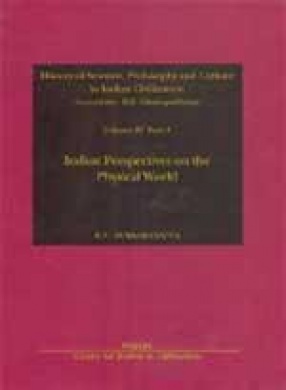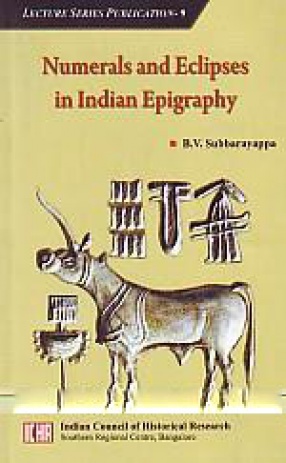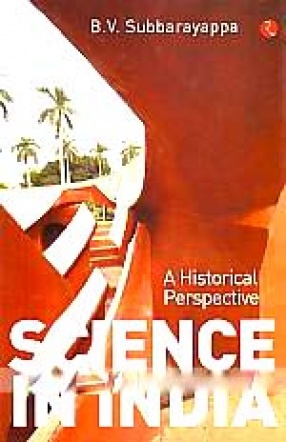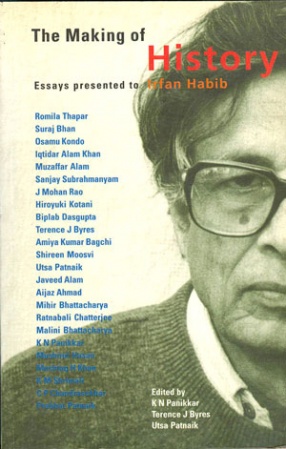The Volumes of the Project on the history of science, philosophy and culture in Indian civilization aim at discovering the main aspects of India’s heritage and present them in an interrelated way. These volumes, in spite of their unitary look, recognize the difference between the areas of material civilization and those of ideational culture. The project is not being executed by a single group of thinkers and writers who are methodologically uniform or ideologically identical in their commitments. In fact contributions are made by different scholars with different ideological persuasions and methodological approaches. The project is marked by what may be called ‘methodological pluralism’. In spite of its primary historical character, this project, both in its conceptualization and execution, has been shaped by many scholars drawn from different disciplines. It is for the first time that an endeavour of such a unique and comprehensive character has been undertaken to study critically a major world civilization like India. In tune with the volumes published or contemplated, under the PHISPC, which aim at presenting India’s multi-faceted heritage in an interrelated manner, this volume too tries to throw light on the varied, but integrated, thought-structures pertaining to the physical world. The intellectual endeavours of Indian savants, both orthodox and heterodox, encompassed not only the attempts to find out the ‘essence’ behind all manifestations, but also the problems of substance, qualities and motion; atomism; space and time; heat and light. Some epistemological attempts too were made with a view to seeking the rationality or the validity of their knowledge. Such knowledge, however, was an integral part of a holistic vision of man in nature and in recognition of the consonance between microcosm and macrocosm. This volume is in the nature of a perspective on these and related Indian thoughts. Wherever necessary and possible, a brief review of the concerned ideas in the other culture-areas has been given to facilitate a comparative understanding, besides a chapter on Modern Perspective on the physical world. Relevant original passages in Sanskrit under references, an extensive bibliography of both primary and secondary sources, and a glossary of technical words have been included in this volume. It s hoped that these will stimulate interested readers towards further intensive studies.
History of Science, Philosophy and Culture in Indian Civilization: Indian Perspectives on the Physical World (Volume IV, Part 3)
$61.20
$68.00
In stock
Free & Quick Delivery Worldwide
All orders amounting to US$ 50 or more qualify for Free Delivery Worldwide. For orders less than US$ 50, we offer Standard Delivery at $14 per book.
ABOUT THE AUTHOR B.V. Subbarayappa
B.V. Subbarayappa (b. 1925), an Editorial Fellow of PHISPC, is Visiting Professor at the National Institute of Advanced Studies, Bangalore. He was formerly Executive Secretary of the Indian National Science Academy, New Delhi; first Project-Coordinator and Member-Secretary of the National Commission for History of Science in India; Professor of History of Science at Birla Institute of Science and Technology, Pilani; and Director, Discovery of India project, Nehru Centre, Bombay. He is the Editor/author of several books on history of science in India and has published nearly a hundred papers on this subject in national and international journals and other publications. He was the President (first non-Westerner to be so elected) of the Science Division of the International Union of History and Philosophy of Science, related to UNESCO (1998-2001); elected Member of the International Academy of History of Science, Paris (1987); recipient of Honorary Doctorate from the University of Bologna, Italy; and R.C. Gupta Endowment Prize and Medal (2003) for History of Science from the National Academy of Sciences, Allahabad.
reviews
0 in total
Review by Anonymous
History of Science, Philosophy and Culture in Indian Civilization: Indian Perspectives on the Physical World (Volume IV, Part 3)
Be the first to review “History of Science, Philosophy and Culture in Indian Civilization: Indian Perspectives on the Physical World (Volume IV, Part 3)” Cancel reply
You must be logged in to post a review.
Bibliographic information
Title
History of Science, Philosophy and Culture in Indian Civilization: Indian Perspectives on the Physical World (Volume IV, Part 3)
Author
Edition
1st ed.
Publisher
ISBN
8187586176
Length
xxiv+436p., Tables; References; Glossary; Bibliography; Index; 29cm.
Subjects







There are no reviews yet.